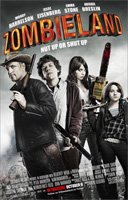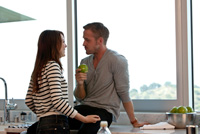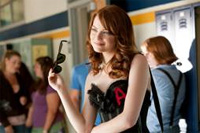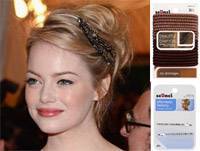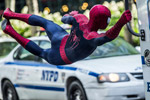Emma Stone Magic in the Moonlight
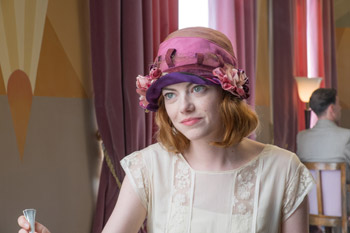
Emma Stone Magic in the Moonlight
Cast: Eileen Atkins, Colin Firth, Marcia Gay Harden, Hamish Linklater, Simon McBurney, Emma Stone, Jacki Weaver
Director: Woody Allen
Running Time: 98 minutes
Synopsis: Set in the 1920s on the opulent Riviera in the south of France, Woody Allen's Magic in the Moonlight is a romantic comedy about a master magician (Colin Firth) trying to expose a psychic medium (Emma Stone) as a fake.
Chinese conjuror Wei Ling Soo is the most celebrated magician of his age, but few know that he is the stage persona of Stanley Crawford (Firth), a grouchy and arrogant Englishman with a sky-high opinion of himself and an aversion to phony spiritualists' claims that they can perform real magic. Persuaded by his life-long friend, Howard Burkan (Simon McBurney), Stanley goes on a mission to the Côte d'Azur mansion of the Catledge family: mother Grace (Jacki Weaver), son Brice (Hamish Linklater), and daughter Caroline (Erica Leerhsen). He presents himself as a businessman named Stanley Taplinger in order to debunk the alluring young clairvoyant Sophie Baker (Stone) who is staying there with her mother (Marcia Gay Harden). Sophie arrived at the Catledge villa at the invitation of Grace, who is convinced that Sophie can help her contact her late husband, and once there, attracted the attention of Brice, who has fallen for her head over heels.
From his very first meeting with Sophie, Stanley dismisses her as an insignificant pip-squeak who he can unmask in no time, scoffing at the family's gullibility. To his great surprise and discomfort, however, Sophie accomplishes numerous feats of mind-reading and other supernatural deeds that defy all rational explanation, leaving him dumbfounded. Before long, Stanley confesses to his beloved Aunt Vanessa (Eileen Atkins) that he has begun to wonder whether Sophie's powers could actually be real. If they were to be true, Stanley realises that anything might be possible, even good, and his entire belief system would come crashing down.
What follows is a series of events that are magical in every sense of the word and send the characters reeling. In the end, the biggest trick Magic in the Moonlight plays is the one that fools us all.
Magic in the Moonlight
Release Date: August 28th, 2014
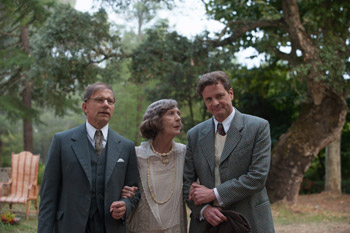 About The Production
About The Production
Woody Allen has been fascinated with magic since he started performing tricks as a teenager, and since then magic and magicians have often made appearances in his work: in his famous standup routine "The Great Renaldo"; in his O. Henry Prize-winning short story "The Kugelmass Episode"; in his play "The Floating Lightbulb" (where a main character is a young magician); in the "Oedipus Wrecks" segment of New York Stories; and in Scoop, where he memorably played the magician, The Great Splendini, himself. His films have also included hypnotists (Broadway Danny Rose, The Curse Of The Jade Scorpion), a healer (Alice), and a fortune teller (You Will Meet A Tall Dark Stranger).
Many of his other films, most notably Zelig, The Purple Rose Of Cairo, Midnight In Paris, have whimsical fantasy woven into their stories and themes, as does Woody Allen's new romantic comedy, Magic In The Moonlight.
Spiritual mediums were all the rage during the 1920's, when Magic In The Moonlight is set. "At the time much was made of it," says Woody Allen. "Very renowned people like Arthur Conan Doyle [creator of Sherlock Holmes] took it very seriously. There were all kinds of incidents like spirit photographs that people were wondering about. Séances were very common." The greatest magician of that era, Harry Houdini, attended many séances, debunking every clairvoyant he encountered. Interestingly, Houdini wasn't motivated by a desire to expose con artists, but by his sincere longing to discover that communicating with the dead was possible. Finding so much fraud was a disappointment to him, but at the time of his death, he still held out hope for an afterlife.
On the surface, Stanley Crawford (Colin Firth) is the opposite of Houdini. A world-famous magician who performs in disguise as the Chinese conjurer Wei Ling Soo, Stanley rejects outright the possibility of any afterlife. "He is an intelligent, scientific-minded, rational person, so what he sees as the stupidity of the gullible public and the fraudulently exploited grates on him," says Woody Allen.
Says Colin Firth, who plays Stanley: "He is supercilious, judgmental, cynical and arrogant, and has a very high opinion of his superior intellect. As a specialist in the art of illusion, he is a skeptic when it comes to anything that is spiritual, mystical, or occult. He prides himself on exposing the people who claim that there is actually something genuinely magical going on at things like séances."
Colin Firth continues: "I don't think I have ever played a protagonist in a film who gets so close to being completely unsympathetic. I'm sure the audience is rooting for him to get a pie in the face. The degree to which he is so completely dismissive of everybody else makes you long for him to be taken down a peg or two."
Stanley is intrigued when his childhood friend and fellow magician, Howard Burkan (Simon McBurney), tells him about a young psychic, Sophie Baker (Emma Stone), who is living with a wealthy American family, the Catledges, residing in the south of France. Howard has tried everything he can think of to expose any trickery on her behalf, but is completely baffled by her apparent powers. Howard proposes that Stanley postpone his planned trip with his fiancée Olivia (Catherine McCormack), to come to the south of France and expose Sophie as a fraud.
"I think the reason Stanley enjoys Howard's company is because he makes him feel good about himself," says Simon McBurney. "Howard openly acknowledges him as the more accomplished performer, and this confirms Stanley's place in the pantheon of great magicians." Making his appeal to Stanley as "the greatest debunker in the world," Howard persuades Stanley to take on the challenge.
As Stanley is both world-famous and anonymous – nobody knows the true identity of the great Wei Ling Soo – he presents himself in the Catledge home as a businessman named Stanley Taplinger. As an elite and cultivated British man, Stanley is not impressed by Sophie Baker (Emma Stone) and her mother (Marcia Gay Harden), Americans that come from a very poor background. Says Firth: "He considers her to be an inconsequential street urchin and he thinks it will be absolutely no problem to unmask her as a fake."
Much to his surprise, Stanley discovers that Sophie is able to get mental pictures and impressions about people, their pasts, and their departed loved ones, that he finds impossible to explain. Despite how closely Stanley scrutinises her every move, Sophie continues to surprise and bewilder him. She tells him about events in his life she couldn't possibly know about. Instead of him discrediting her, it is Sophie who unmasks him as Wei Ling Soo. Undeterred by apparent proof to the contrary, Stanley remains convinced that she is unconditionally a fraud and that he will soon find her out.
"Stanley challenges her a lot but Sophie knows she can consistently shock him." says Emma Stone. "That gives her power. I also think she finds him really charming so she turns on a kind of schoolyard teasing with him."
Sophie and Mrs. Baker have been able to take residence in the Catledge chateau because the mother, Grace (Jacki Weaver), is desperate to make contact with her departed husband.
"Grace is naïve and very sweet-natured," says Jacki Weaver. "She says, 'There's got to be something more than what we can actually see,' and she really believes that. I think a lot of people think like that." Grace's desperation and eagerness makes her an easy target for Mrs. Baker, who is able to squeeze money out from her for a "foundation" she and Sophie want to start.
Says Marcia Gay Harden: "Sophie has the ability to charm the pants off people, but her mother isn't as charming, she's more shrewd. Because Sophie is such a gifted medium, that combination has taken them a long way." Says Woody Allen: "Mrs. Baker is a hustling stage mother. She's got a meal ticket with the kid, pushes it, and together they manage to eke out a living. When she sees an opportunity to make some substantial money – she grabs it."
In addition to her gifts as a medium, Sophie is also a dazzler with a magnetic personality, so it's not surprising that Brice Catledge (Hamish Linklater), the amiable scion of the family, falls head over heels for her.
"He's willing to give her the world if she'll take it," says Hamish Linklater. "He's not interested in her because she's a psychic"although it is very nice in terms of how she makes his mother feel – he just loves her and wants to be with her."
Says Woody Allen: "Brice isn't a bad guy, he's just not a very substantial person. But what he is offering her is a very tempting proposition, particularly back in the 20s, because it would make her and her mother wealthy for life."
Also in the house are Brice's sister, Caroline Catledge (Erica Leerhsen), and her psychiatrist husband, George (Jeremy Shamos). Suspicious about Sophie, they were the ones who initially summoned Howard to check her out.
Says Woody Allen: "I wanted to have someone there from the sciences because the scientific community is always befuddled by these kinds of people. You would think that they wouldn't be, but in real life it's quite the opposite. George has gone to medical school and studied psychiatry and doesn't buy into it at first – but Sophie is so convincing that even he starts to believe."
Living near the Catledge estate is Stanley's beloved Aunt Vanessa (Eileen Atkins), who provided a lot of his upbringing when he was a child and to whom he is closer than his own parents. Vanessa understands Stanley so well that she is the only one capable of guiding him, a difficult task with someone who thinks he knows everything. "Vanessa plays a very cool hand with him," says Eileen Atkins. "She sees him as a little boy in the same way most parents go on seeing their children as children. So when she sees that things are going wrong with Stanley, she doesn't overreact. She wins by saying the reverse thing because she knows that is how to get Stanley to do what she thinks is the right thing."
Says Colin Firth: "Very tolerantly, very indulgently, Vanessa coaxes his true feelings out of him. She is not explicit about it, she just patiently allows him to go through his own thought process at his own pace and learn his own lessons."
As Stanley becomes increasingly mystified by Sophie, he takes her to see Vanessa, who he knows has a keen eye for sizing people up. And it is in Vanessa's home that Sophie performs what may be her most spectacularly unexplainable act of mind-reading. "I don't think Vanessa is too bothered by how Sophie did it," says Eileen Atkins.
"She doesn't think, 'this girl has amazing abilities' – she thinks 'this girl has got to the heart of me very quickly,' and right away, Vanessa is quite pleased to have that connection. And she thinks, there is a 'maybe' about everything; maybe the girl does have the power to see things. Vanessa is never going to say there absolutely are no miracles because there might be miracles."
Says Colin Firth: "Vanessa is the wisest character in the story. She knows that real foolishness comes from being too certain of everything. Really wise people understand there is a lot we don't know and that certainty is not equivalent to wisdom."
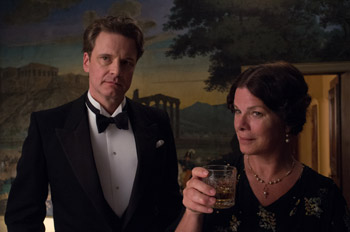 Stanley, on the other hand, responds to Sophie's feat at Vanessa's by making a leap from utter skepticism into outright faith. "He doesn't just fall into thinking that Sophie might be real," says Colin Firth. "Something that has been buried inside him for a long time suddenly explodes into a kind of childlike joy. 'If she is real then I've been wrong about everything. And if I've been wrong about everything then it isn't just the seeing world which exists and everything is possible.
Stanley, on the other hand, responds to Sophie's feat at Vanessa's by making a leap from utter skepticism into outright faith. "He doesn't just fall into thinking that Sophie might be real," says Colin Firth. "Something that has been buried inside him for a long time suddenly explodes into a kind of childlike joy. 'If she is real then I've been wrong about everything. And if I've been wrong about everything then it isn't just the seeing world which exists and everything is possible.
Maybe there is an afterlife and if there is an afterlife then maybe there is a God.' Stanley has spent his life trying to approximate magic because he yearns for it. And I think because he has been disappointed by the lack of real magic in his life he has a hostility towards anybody who makes any claims for it."
Says Emma Stone: "I love the way that Stanley, a man who is so successful at creating illusions for large groups of people to see, is transformed by Sophie, who makes him believe in a world that he can't see."
While Sophie rejuvenates Stanley emotionally, she is elevated intellectually by him. Says Woody Allen: "Because he is well-read and demanding, Stanley exposes Sophie to things she might not otherwise have come in contact with. He opens those doors and awakens interests in her to pursue some of these things."
Says Emma Stone: "Her tastes and her understanding of the world expands because she grew up in a very different world than the one Stanley comes from. She learns from him and that is very exciting for her."
"We wanted to make a light and happy picture," says Darius Khondji, "but with a strong color palette to structure the film visually. My principal inspiration was the French photographer Jaques Henri Lartigue. We used old Cinemascope lenses from the seventies and photographed it on film, using a special process to lower the contrast and soften the images naturally.
We then worked with color supervisor Pascal Dangin, who helped us render the images with a touch of the "autochrome" look of the early color from the beginning of the 20th century."
Darius Khondji shone an especially radiant light on Emma Stone. "Woody Allen asked me to convey her beauty on film and I hope I did," says Darius Khondji. "I felt she had a natural glow, this combination of the color of her skin, hair and eyes, but it was mainly the way she played the character that inspired me to photograph her this way." Says Linklater. "She is a gorgeous girl but with that lighting she looked like she walked out of a fresco every single day."
Says Stone: "He basically put me in a white box of light. He took a long time to light me and I'm very grateful."
The interiors and exteriors of the Catledge home were a blend of two locations: Villa Eilenroc in Cap d'Antibes and Villa la Renardière in Mouans-Sartoux. Other locations included: the bar and restaurant at the Hotel Belle Rives in Juan-les-Pins: Chateau du Rouet in Le Muy, a vineyard used as Aunt Vanessa's house; Hotel Negresco in Nice (used as the Berlin Cabaret); and Opéra de Nice (the exterior of the Berlin theatre). The observatory that Stanley and Sophie take refuge in during the thunderstorm is the Observatoire de la Côte d'Azur (Nice Observatory) on the summit of Mont Gros.
Built in 1887, with a dome designed by Gustave Eiffel (designer of the legendary tower), the observatory is still functioning. Even if the architecture matched the period, all the sets had to be extensively redressed with period 10 furnishings by production designer Anne Seibel. The ball scene was a set completely created by Seibel in the "backyard" of one of the Catledge home locations, Villa Eilenroc. Most of the costumes seen in the movie are originals from the period, found through a worldwide search spanning Paris, London, Madrid, Rome, Toronto, and Los Angeles by costume designer Sonia Grande and her team. "We always tried to use originals," says Grande.
"But when we couldn't find the elements that the different outfits and characters required, we built them from original fabrics and pieces that we restored and recycled."
A color scheme emerged organically, with the "believers" in the story generally clothed in whites and pastels and the "skeptics" in dark colors. "The first thing we were obedient to was the logic of the moment," says Woody Allen. "It was logical that Stanley, Howard and George would be wearing suits, as that was what they wore when we researched it. But that did play into the sense we had of trying to make the other people lighter, more open to the imaginative, magical side of life."
As in all his films, in Magic In The Moonlight, Allen employs very long takes with a lot of dialogue, blocking and camera moves. Says Colin Firth: "On the face of it, it seems very simple but it does mean that everything has to be right. Sometimes you do seven or eight takes and he'd be delighted but you dropped your hat and you are going to have to do the whole thing again. He doesn't rehearse so the first take is a kind of rehearsal and you have to repeat it until all the creases have been ironed out and everybody is up and running." Says Stone: "Working with Woody was a dream come true for me. I had heard he was quiet and very serious and kept his distance, but my experience was just the opposite. He was incredibly friendly and funny and told me many stories."
Says Colin Firth: "He was very engaged as a director, very detailed. He would come in and give you extremely precise, thorough and detailed notes on what he wanted to see unless he liked it and if he did he'd just move on.
Says Eileen Atkins: "When we did one scene and we knew we were very bad and it finished and he just said "Well that wasn't very good was it?" And I laughed and said to him, 'It was terrible. What are we going to do?' and he just laughed back and said 'be better next time.' And really that is all you need to say most of the time. He would give you something if you asked for it, but he really knows how actors work because he is an actor himself. He knows that if he casts them correctly and he pleases them correctly, then you just have to let them do it."
Working in an isolated location, the cast bonded and often had dinners together, something that is rare on movie sets. Says Emma Stone: "Colin Firth says making movies is an alchemical process because you need to believe that you are these people and that this is your real world while you are making the movie as actors professionally. Making the film is a little time capsule in my mind I wish I could go back to. It was one of my favorite working experiences of all time."
Says Colin Firth: "Emma Stone is sort of the person who energises a film set. She was incredibly popular and got to know everybody. She has an upbeat funny nature which I felt invigorated people. She became a great friend."
"We were in the south of France and the theme was magic and it was the 20s," says Emma Stone. "I think everyone was kind of swept up in a happy-go-lucky 'Midsummer Night's Dream' sort of feeling. For me, the experience and the story itself had the same kind of feeling you get when you go to a magic show. Every time I've seen a close-up magician I think it must be real even though there is no way it is real. I think there is something to how much we want to suspend our disbelief and be truly amazed by someone. We want stories, we want fairy tales, we want myths."
Says Colin Firth: "I think it is about how you feel about mystery. It is how you feel about things that you can't categorise, that you can't solve scientifically or logically. And I think people have wildly diverging attitudes and relationships to those things. Some people chase the mystery and want to solve it scientifically and other people are just blindly hostile to anything that can't be solved or can't be understood. And there are some people who are happy to let mystery be a mystery."
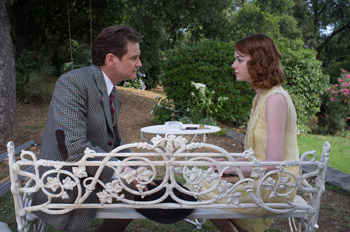 Says Simon McBurney: "When you see something and you don't know how it happened, in that moment you catch the same sensation you had when you were five years old and you saw flowers coming out in the spring or you saw your favorite uncle making a coin appear from behind your ear. It appeals to the part of us that wants to see the world anew. We can become children again in the face of extraordinary musicianship, a great performance in the theatre, in the art gallery, or the wonders of nature. Those things can give us a sense of timeless wonder that is truly magical."
Says Simon McBurney: "When you see something and you don't know how it happened, in that moment you catch the same sensation you had when you were five years old and you saw flowers coming out in the spring or you saw your favorite uncle making a coin appear from behind your ear. It appeals to the part of us that wants to see the world anew. We can become children again in the face of extraordinary musicianship, a great performance in the theatre, in the art gallery, or the wonders of nature. Those things can give us a sense of timeless wonder that is truly magical."
The biggest mystery of all is falling in love, something that is as real as it is impossible to fully explain. "It's a natural human condition to want things to be a little more magical," says Emma Stone. "And the magic in the movie is love. And love just happens. It might not make sense logically but that's what's so beautiful about it and that's what's so magical about it."
Says Woody Allen: "Seeing someone and being instantly attracted to them is an unexplainable thing. You can try to give reasons for it: I like the person's style, I like their sense of humour, I like their ideas, I like the way they look – but in the end, you never really know what it is because someone with the same style and sense of humour or whatever, you are not attracted to. It is so complex because there is something intangible there. I'm sure a million years from now with computers they will be able to mathematically graph what is going on, but for now and for the foreseeable future there is no proof it will ever change. There is a certain magical excitement to meeting somebody and having positive romantic feelings for them."
Magic in the Moonlight
Release Date: August 28th, 2014
Have You Seen This?
MORE
- Mission: Impossible Fallout
- Glenn Close The Wife
- Allison Chhorn Stanley's Mouth Interview
- Benicio Del Toro Sicario: Day of the Soldado
- Dame Judi Dench Tea With The Dames
- Sandra Bullock Ocean's 8
- Chris Pratt Jurassic World: Fallen Kingdom
- Claudia Sangiorgi Dalimore and Michelle Grace...
- Rachel McAdams Disobedience Interview
- Sebastián Lelio and Alessandro Nivola...
- Perri Cummings Trench Interview

